
October 2022
Mobilize
Workers Power Leading the Masses Against the
Police-Military Regime!
Brazil: “Broad Front” Blocks Workers Mobilization Against Militarist Threat
In the Elections: Vote No
Neither
Bolsonaro,
Nor Lula/Alckmin
In the Streets: Class
Struggle
of
the Workers and Oppressed to Crush
the Coup Danger and Fascistic Forces
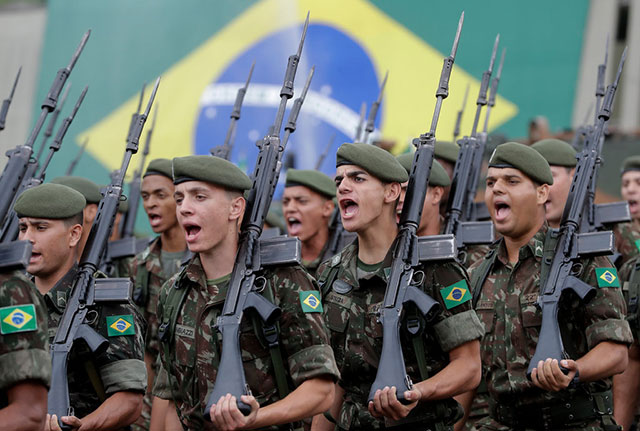
On orders of bonapartist president Bolsonaro and the Army High command, in 2019 soldiers marched in celebration of the 1964 coup d’état that ushered in the military dictatorship that lasted a quarter century. Mobilize workers power against the police/military regime and any coup attempt! (Photo: AP)
For Socialist Revolution
Against Deadly Capitalist Rule
The "Broad Front" of the Reformist Left (PT and Satellites) with the Conservative Rightists Who Ousted Them Won’t Repeal Anti-Worker “Reforms”
It Is No Alternative to the Bonapartist Government of Generals in Pajamas Who Dream of Repeating the Coup d’État of 1964
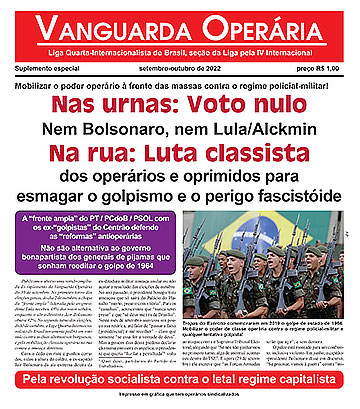
The following article is a translation of the expanded supplement to Vanguarda Operária (30 September), published by the Liga Quarta-Internacionalista do Brasil, section of the League for the Fourth International. In the first round of the Brazilian elections, on October 2, the “broad front” slate of ex-president Luiz Inácio Lula da Silva won 48% of valid votes, while ultra-rightist Jair Bolsonaro got 42%. In the second-round runoff election, to be held on October 30, the LQB is again calling for a “no” vote against both of these bourgeois alternatives, and for working-class mobilization in the streets against the rightist militarist threat.
With his trademark gesture, thumb and forefinger cocked, fist clenched, imitating a pistol, hands at holster level, ex-captain, now-president Jair Bolsonaro, representing the far right wing of the former military dictatorship1 is threatening to annul or refuse to heed the outcome of the October elections. Last year, the bonapartist president threatened that he would only leave the Palácio do Planalto (Brazil’s White House) either “dead, arrested or with victory.” For the “bastards” he added, “I will never be arrested” and “only God can get me out of Brasília,” Brazil’s capital. This September he softened his rhetoric a bit, even talking of “handing over the [presidential] sash and retiring” – of course, only “if it is God’s will.” But a few days after this pious declaration on an evangelical radio station, the president who wanted to “shoot the petralhada”2 is back to attacking the Supreme Electoral Court (TSE), claiming that “If we don’t win in the first round, something abnormal happened inside the TSE.” Now (September 29) he writes that “the Armed Forces will have to act,” and without delay.
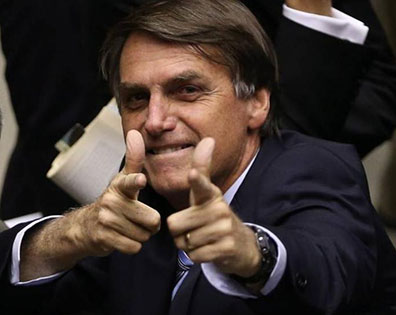 President Bolsonaro threatened to shoot PT
supporters and “if needs be, we will go to war” against
“internal enemies.”
President Bolsonaro threatened to shoot PT
supporters and “if needs be, we will go to war” against
“internal enemies.” (Photo: Aílton de Freitas / Agência O Globo)
The stage is set for a confrontation, quite possibly a violent clash. In June, the captain-president Bolsonaro said in a speech, “If needs be, we will go to war” against “internal enemies.” Now the moment of truth has arrived. What is to be done? Key sectors of capital and the reformist left are calling to vote for the presidential candidacy of Luiz Inácio Lula da Silva of the Workers Party (PT) at the head of a “broad front” of ten parties. But this bourgeois mega-coalition promises to keep the anti-worker “reforms” enacted by Bolsonaro and his predecessor, Michel Temer, after the impeachment of the PT president, Dilma Rousseff in 2016.3 It appeals to the TSE and the Supreme Court (STF) to save them. But this STF endorsed Lula’s arrest in 2018 to prevent him from winning the last election, and now it has agreed to the military conducting a parallel vote count – a recipe for disaster.
 By chaining working people to sectors of the
bourgeoisie, the Lula leadership blocks powerful class
struggle to crush the coup plotters.
By chaining working people to sectors of the
bourgeoisie, the Lula leadership blocks powerful class
struggle to crush the coup plotters. In fact, the Lula leadership, by subordinating the workers and the oppressed to sectors of the class enemy through its ever-broader coalitions, is preventing a powerful struggle to crush the coup plotters, thereby preparing what could be a bloody defeat.
We Trotskyists of the Liga Quarta-Internacionalista do Brasil (Fourth Internationalist League of Brazil) say no to class collaboration. In the elections we call to cast a “no” ballot (voto nulo) rejecting all the candidates while at the same time calling to mobilize working-class power in the streets to crush the coup threat and its fascistic supporters. We have already had 13 years of popular-front PT governments that protected capitalist interests in exchange for a few crumbs of welfare programs. The result: a bonapartist (police/military) government, the growth of the murderous ultra-right and the elimination of countless rights and gains of working people. We then went through two years of the COVID pandemic with a toll of hundreds of thousands of deaths due to the sabotage of the public health system. The showdown has now arrived, and reformism is bankrupt. A revolutionary workers party must be forged in struggle for a workers and peasants government and international socialist revolution to overthrow putrefying capitalism.
On the Eve of Confrontation
On the eve of the first round of the general elections, Lula’s presidential candidacy has a wide lead in the opinion polls with 48% (and 50% of “valid” votes), against 33% for Bolsonaro.4 The margin would be insurmountable even if the polls underestimate the Bolsonaro vote; but even so, Lula winning an absolute majority in the first round is uncertain. Hence the pressure from Lulistas to cast a “useful vote” on October 2, and the insistence of Bolsonaro & Co. in questioning the legitimacy of the electoral system. Thus we can see the outlines of a post-election confrontation in which the enraged losers reject the outcome of the vote.
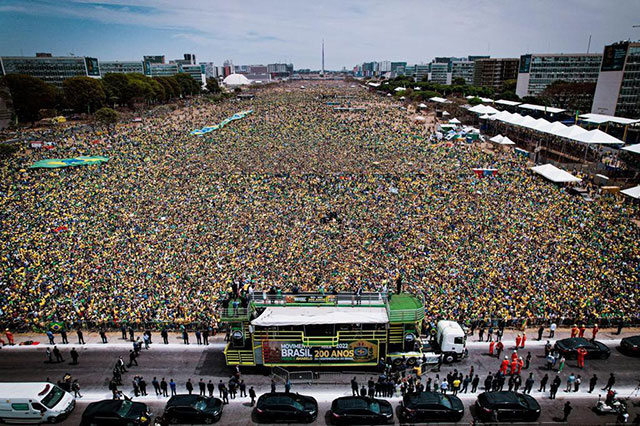
Half a million supporters of Bolsonaro in a gigantic election rally on the esplanade outside government ministries in Brasília on September 7, in the commemoration of the bicentennial of Brazil’s independence. (Photo: Presidência da República)
There should be no illusions about the numbers or reactionary nature of the hard-core Bolsonaristas. On September 7, the celebration of the bicentenary of Brazil’s independence turned into huge gatherings of supporters of the bonapartist president, who aspires to a military and police regime, with half a million in Brasília and hundreds of thousands more in São Paulo and Rio de Janeiro. The ultra-rightist hordes carried banners with slogans (many in English) such as “We Demand Military Intervention with Bolsonaro in Power and Criminalization of Communism in Brazil Now!!!” Also, “We Need to Purge the STF, TSE and Congress!” and “We Call on the Armed Forces to Take Over the Government of Brazil!” The first lady, Michelle Bolsonaro, shouted to the crowd that “this nation belongs to the Lord Jesus” and “the enemy shall not win!”
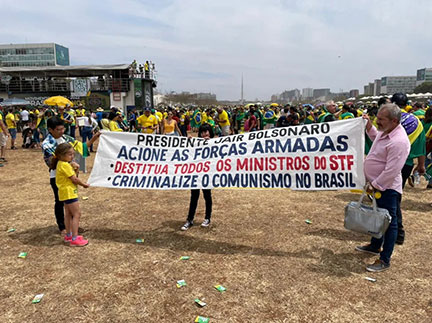 The fascistic character of Bolsonaro’s hard
core. At the September 7 rally in Brasília there were
dozens of banners calling for intervention by the armed
forces against the courts and communists.
The fascistic character of Bolsonaro’s hard
core. At the September 7 rally in Brasília there were
dozens of banners calling for intervention by the armed
forces against the courts and communists. (Photo: Walder Galvão / TV Globo)
But there was no corresponding massive national response on the other side – at most regional demonstrations celebrating that “Lulinha paz e amor está de volta” (Little Lula of peace and love is back), as the PT leader introduced himself at a dinner with prominent businessmen on September 27. Key sectors of the Brazilian bourgeoisie are alarmed about the future direction of the country. They consider Bolsonaro a factor of instability that could provoke an explosion. They are well aware that Brazil not only has the second highest number of deaths from COVID in the world (after the United States) – with 685,000 dead due to the pandemic – but that the standard of living for workers has fallen drastically in recent years. In 2021, inflation skyrocketed to 12% while wages dropped by more than 8%. In the face of this disaster, the major capitalists are hoping to contain popular anger with electoral illusions in Lula.
Another strand of the response from traditional sectors of the Brazilian bourgeoisie is to turn to Uncle Sam to beg for protection. U.S. rulers are making a show of taking a stand against an attempted Bolsonaro “self-coup” to keep himself in office.5 On June 9, at the “Summit of the Americas,” U.S. president Joe Biden was assured by Bolsonaro that he would not interfere in the October elections.6 When the Brazilian president gathered foreign ambassadors at the Planalto Palace on July 20 to claim that the country’s voting system could be rigged, the next day U.S. State Department spokesman Ned Price declared that “Elections in Brazil are a model,” as the website Poder 360 headlined. On July 24, a delegation of 19 Brazilian NGOs traveled to lobby in the corridors of power in Washington.
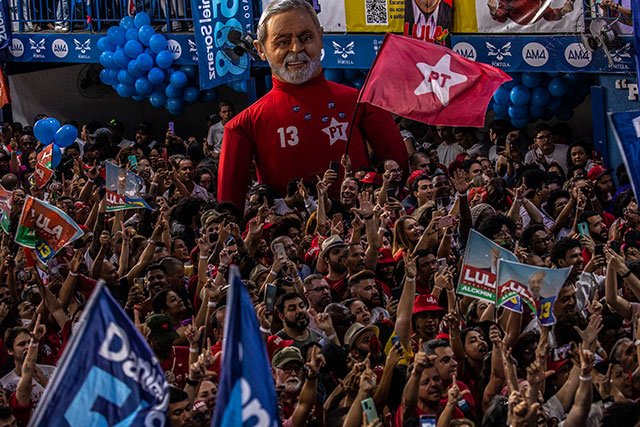
Demonstration by supporters of Lula and the PT on September 25. Appealing for calm, the leaders of the “broad front” didn’t try to counter Bolsonaro's independence day rallies with a big national mobilization, but only held regional demonstrations. (Photo: Dado Galdieri for the New York Times)
That the U.S. claims to oppose a coup d’état would be something new, given that in this 21st century alone it has already supported coups or attempted coups in Bolivia, Haiti, Honduras, Nicaragua, and Venezuela. But in any case, it is not clear that such verbal gestures would have the effect of preventing one. The day after Bolsonaro’s meeting with Biden in June, Brazilian defense minister General Paulo Sergio Nogueira complained to the national press that the TSE was not addressing the military’s complaints about the electoral system. And when on September 29 the U.S. Senate passed a resolution urging the White House to “immediately recognize the result of the election in Brazil” and for “reconsideration of relations” with any Brazilian government resulting from “anti-democratic methods,” that same day a document from Bolsonaro’s Liberal Party recycled 24 accusations that the October elections will be rigged.
At the same time, acts of violence by Bolsonaro partisans against opponents are multiplying. In July a PT candidate for vice-mayor of Foz do Iguaçu was executed at his birthday party by a Bolsonarist prison guard. Soon after the rallies of September 7, a Lula supporter in Mato Grosso was murdered by a Bolsonaro supporter who tried to behead him with an axe. On September 24, a Bolsonaro supporter entered a bar in Ceará, asked “who here is a Lula voter” and stabbed to death a man who replied “I am.” And on the 27th, a PT election captain in Manaus was beaten in the head with an iron bar by a Bolsonaro supporter. Overall, UNIRIO’s Electoral Research Group reported 214 politicized assaults in the first half of 2022 (Reuters, 27 September).
Capitalist “Democracy” Under Police and Military Supervision
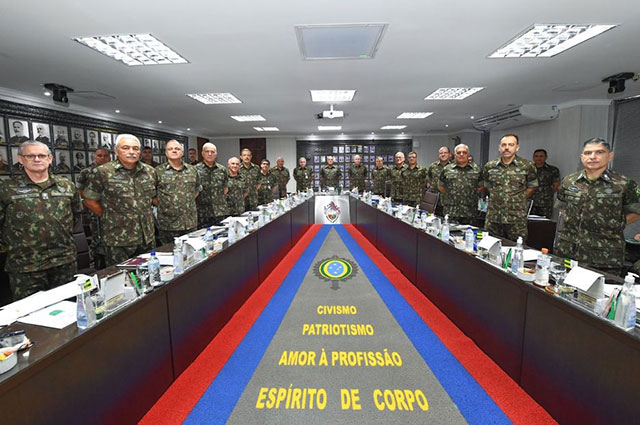
Meeting of the Brazilian Army High Command at its headquarters. According to reports, the military chiefs decided to "support the results of the presidential elections.” Perhaps, or not. (Photo: Centro de Comunicação Social do Exército)
In other words, the stage is set for a showdown. So, if Bolsonaro should lose, will there be a putsch, a classic coup d’état? The consensus among the traditional bourgeois right and the institutional reformist left (PT, PCdoB, PCB, PSOL,7 etc.), and even part of the misnamed far left, is that the conditions are not there for a military takeover. They reason as follows: in the 1964 coup, the branches of the military were united against the government of João Goulart; the bulk of the bourgeoisie supported the generals who rose up; the great majority of the press did so also, and the US embassy was up to its neck in the preparations. Today, they argue, the military top brass doesn’t want a coup, the Centrão (coalition of the traditional conservative right wing) is in coalition with Lula, his former archenemy O Globo is acting like a PT election agency, and the U.S. is against it. Conclusion: scenario dismissed.
Right now there is an offensive of reassurances on the subject: the media are publishing in unison that the military “guarantees ... that there will not be a single tank on the street, regardless of the outcome of the elections” (Agência Pública, September 28); that “in a meeting at Headquarters, the Army High Command sealed its position of supporting the results of the presidential elections” (Estadão, September 30), and that “the phrase ... spread among the troops since the first week of August” is “Whoever wins, takes it” (Rede Brasil Atual, September 30). Maybe, or maybe not. Let’s not forget that in their coverage of September 7 in the capital, while these media were stressing that “Bolsonaro embarrasses the country on the Bicentennial” with his electoral mega-rally, they hardly mentioned the huge “civic-military” parade that lasted two and a half hours, with the participation of all the armed bodies, police and military, together with Bolsonarist sectors.
But the film doesn’t end there. Socio-political-military research institutes charged with anticipating, analyzing and formulating responses for the imperialists about upcoming clashes agree that, as the International Crisis Group writes, “The highest risk of violence around the election at present seems to rest on the possible reaction of Bolsonaro devotees in the event of an adverse electoral result” and that a “more realistic” scenario would be “that the military and police might not respond if called upon to contain violence or even an attempted uprising by Bolsonaro loyalists, perhaps including members of these forces.” The same analysis quotes a former police officer who notes, “Bolsonaro, and later his sons, knew how to exploit” the “feeling of abandonment of the police, notably the military [police].” It concludes that:
“even if the elections end peacefully, and without major trauma, the currents reinforced by Bolsonaro’s government may not be so easy to dampen. The increasing number of groups professing a hard-right ideology, with easy access to guns and a pointed sense of grievance, could pose a continuing threat of unrest.... Sympathies for these beliefs among military and police personnel complicate matters further.”8
Faced with this very real possibility of an attempt to overturn the results of the election, the traditional conservative bourgeois elite and the reformist left agree in the first instance to turn to the capitalist courts, in particular the Superior Electoral Court (TSE) and the Federal Supreme Court (STF). But it was these bourgeois courts that, in the middle of the 2018 election campaign, ordered the arrest of Lula, at the time the presidential candidate with the most support, on absurd corruption charges. It was not only the rightist judge Sergio Moro and his Lava-Jato (Car Wash) investigation task force that sought to criminalize the PT. The STF approved the use of illegal wiretaps by the federal police of conversations between former president Lula and then-president Dilma Rousseff, to jail Lula and thus prevent him from being elected.9
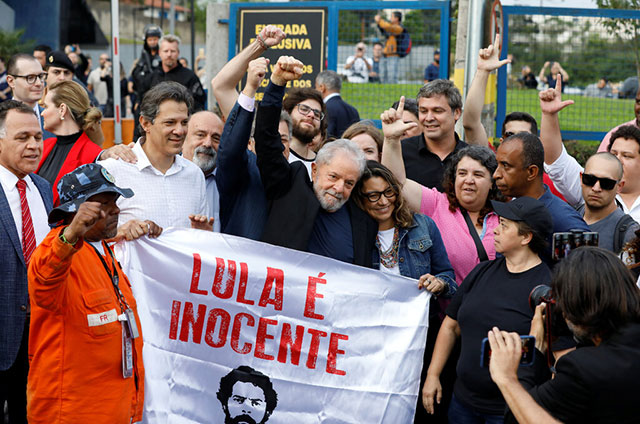
Lula freed, on 8 November 2019, after 580 days in prison in Curitiba, as a result of the "corruption investigation"by the Lava-Jato (Jet Wash) task force which sought to criminalize the PT, with the backing of the Supreme Court, to prevent the PT leader from winning the 2018 elections. But when the bourgeoisie needed Lula’s services in order to throw out Bolsonaro, the justices of the high court discovered that his imprisonment was unjust. (Photo: Rodolfo Buhrer / Reuters)
But when in 2021 the bourgeoisie decided it needed the services of the PT leader in order to dump the erratic Bolsonaro with his disastrous administration of the COVID pandemic, the STF did a U-turn and annulled the trumped-up charges and released Lula after a year and a half of illegal imprisonment. (It also released the assets of the former metal workers union leader, estimated at R$ 27 million [over US$ 5 million]!) And now, after a year of theatrical accusations by President Bolsonaro against the STF justice and current TSE chief Alexandre de Moraes, the latter has negotiated behind closed doors a deal with defense minister Nogueira according to which the military can audit up to 64 electronic voting machines, including use of voters’ biometric data, and that the Army’s Cyber Defense Command would do a parallel count to the TSE’s tallying of votes in 385 voting stations!
Already last year, the Superior Electoral Court, made a dangerous concession to Bolsonaro’s campaign of accusations without evidence of voter fraud, agreeing to include the armed forces among the entities overseeing the electoral process, along with the 32 parties and 15 other organizations, including the Federal Police and the National Confederation of Industry! In the “best” case, this military participation in the vote count would be a means to involve the armed services in endorsing the outcome of the vote. Otherwise, as Folha de S. Paulo (September 12) warned, it could be “used by President Jair Bolsonaro (PL) to spread distrust in the electronic voting machines and further contest the outcome of the election.” In any case, this violates the supposed apolitical character of the armed forces and their subordination to civilian control, and formalizes a “supervised democracy” under the guard of the military, police and capitalists.
No to the Rule of Generals or
Judges,
No to the Deadly Dictatorship of Capital –
For the Liberating Dictatorship of the Proletariat
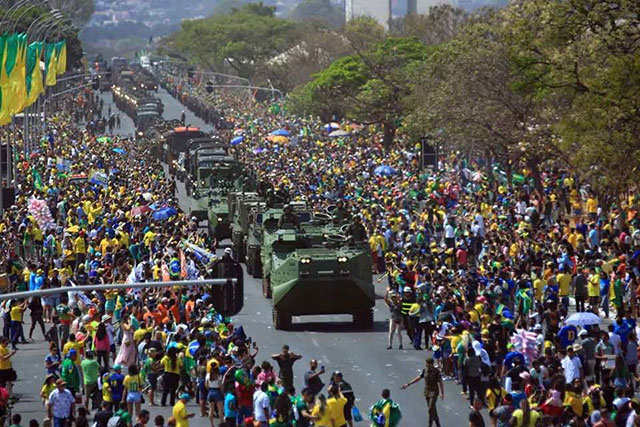
The “cívic-military” parade in Brasília before Bolsonaro’s election rally on September 7. (Photo: Metropoles)
At bottom, the “strategy” of the “center-right” and the reformist left consists of seeking the support of Yankee imperialism. Take a look. Five days after the State Department spokesman praised Brazil’s electoral system on July 21, a “Carta as Brasileiras e aos Brasileiros em Defesa do Estado Democrático de Direito” (Letter to Brazilians in Defense of the Democratic Rule of Law) was released.10 This initiative of the law faculty of the University of São Paulo (USP) received about “3,000 signatures from among bankers, businessmen, jurists, unionists, politicians, actors, and various other personalities,” said the USP newspaper. Soon the number of signatories was over a million. Appealing to Biden, the Carta compared the 6 January 2021 storming of the U.S. Capitol to the threat of Bolsonaro’s mobs in Brazil today:
“We have recently witnessed authoritarian rants that have jeopardized secular American democracy. There, attempts to destabilize democracy and the people’s confidence in the fairness of the elections were unsuccessful. Here, they won’t be either.”
That remains to be seen.
Among the first signers of the Carta was the FIESP, the Federation of Industries of São Paulo, one of the leading lobbies of Brazilian capitalists and a prime mover of the 2016 ouster of PT president Dilma and the 2018 jailing of PT ex-president Lula. The FIESP is also a backer of the “broad front” headed by Lula and conceived at a lunch with another former president, Fernando Henrique Cardoso, of the PSDB,11 in May 2021, when a Datafolha poll showed Lula as the most likely candidate to defeat Bolsonaro. The tucano (PSDB) leader and the former union leader, now a millionaire, have been allies off and on since when in the 1970s Lula supported FHC’s senatorial candidacy for the Brazilian Democratic Movement, the bourgeois opposition authorized by the military dictatorship.
In fact, despite the epithets of “communist” hurled by the Bolsonarists against Lula, the PT leader is nothing of the sort, having modeled himself on the figure of Lech Walesa, the anti-communist trade unionist who played a key role in the counter-revolution in Poland in the late 1980s. But now the question is posed starkly, can the class-collaborationist “broad front” in favor of Lula’s candidacy for president, with PSDB leader Geraldo Alckmin as his vice-president and with implicit backing from Washington, block the militarist Bolsonaro regime and its cheering squads of fascistic fanatics?
Lula has always sought to ally with imperialism. Under the Republican administration of George Bush II, he offered his services as sheriff of the Caribbean, occupying Haiti under the label of the United Nations. In the black republic, Brazilian occupation forces in U.N. blue helmets tested counterinsurgency tactics that they then used in the slums of Rio de Janeiro and the outskirts of São Paulo. Rio is the capital of police killings and the local Military Police has become an agency for industrial-scale murder.12 Militias of former military police officers and firemen, such as those who assassinated Marielle Franco, emerged under the patronage of the Bolsonaro family.13 Sure, U.S. president Barack Obama cheered Lula as “the most popular politician in the world,” adding “I love this guy.” But as the bloody imperialist strategist Henry Kissinger said, “Being an enemy of the United States can be difficult, being a friend is fatal.”
Verbal support from the U.S. does not ensure victory in a stand-off with hard-nosed reactionary forces. As has been universally noted, behind the current Brazilian election crisis is the specter of the attack on the U.S. Congress on 6 January 2021 instigated by Donald Trump, who, after being defeated at the polls, tried to cling to power. Bolsonaro himself has questioned the legitimacy of Biden’s election and on many issues (COVID vaccines, gay and transgender people’s rights, etc.) has acted as a faithful Trump acolyte. But Trump lacked the support of the military high command, while in the Brazilian case which way the armed forces will go is an open question. If, despite Democrats’ howls of a failed “insurrection,” January 6 in Washington was an opera buffa (comic opera) of an imitation military coup, the outcome in Brazil may be quite different.
Reformist parties like the PT, its spin-off PSOL, the former Stalinists-become-social democrats of the PCdoB and PCB, and even smaller currents of the (not so) far left like PCO (Partido da Causa Operária), are counting on Lula and the bourgeois broad front as the remedy to preserve “democracy” and exorcise the demon Bolsonaro. Judging by the polls, one might think that Bolsonarism is already defeated. But if so, why was Rousseff impeached in 2016 at the height of her popularity, and why did Lula himself languish for 580 days in prison? In reality, neither he nor the PT nor the left as a whole seriously fought that election ban, because they all bow down to the “democratic rule of law.” For the same reason they cannot fight Bolsonarism.

Bolsonaro supporters marched on Rio de Janeiro’s Copacabana beach on September 7. To resist a seizure of power by fascistic forces backed by sectors of the officer corps of the Army, Navy and Military Police, worker-peasant defense groups should be organized and powerful strikes launched. (Photo: Dado Galdieri for the New York Times)
A leadership seeking to resist a military takeover – or one by fascistic forces backed by sectors of the officer corps of the army, navy and military police – would organize worker-peasant defense groups, to protect demonstrations and union and leftist headquarters. It would unleash a powerful general strike and strikes of key sectors, paralyzing industry and transportation in a show of proletarian power, able to defeat the forces of the capitalist state. Nothing of the sort has happened, because the leaders accept the rules of the “democratic” capitalist state and depend on its repressive apparatus (military, police, courts and judges). It is up to authentic communist revolutionaries to fight to initiate such elementary measures of struggle against the class enemy, even on a limited scale and local basis.
The Only Road – Struggle for International Socialist Revolution
In the October 2022 elections, most of the left is calling to vote for the Workers Party and its presidential candidate Lula. These include several of the multiple currents of the PSOL, but also smaller groups that falsely claim the heritage of Trotskyism, including the International Marxist Tendency. Other pseudo-Trotskyists are supporting a “Socialist and Revolutionary Pole” led by the PSTU (Socialist Party of Unified Workers), which has offered its ballot slot to other leftist groups. The PSTU, which is running its member Vera Lucia for president, is an anti-communist group that aligns itself with Yankee imperialism over Syria, Venezuela, Cuba and currently supports Ukraine in the war with Russia instigated by U.S. and NATO imperialists. In 2016, the PSTU effectively supported the impeachment of PT president Rousseff, and in 2018 it welcomed the imprisonment of former president Lula. This year, the PSTU says it will support Lula if there is a runoff second round of the election.
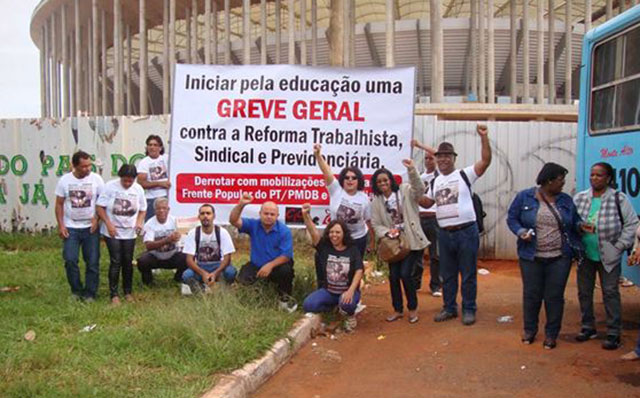
The Liga Quarta-Internacionalista do Brasil e and the Class Struggle Caucus fought in 2016 to launch a general strike against the anti-worker “reforms” of union, labor and pension laws, and against the PT-led popular front that sought to enact them. (Foto: CLC)
We of the Liga Quarta-Internacionalista, the Brazilian section of the League for the Fourth International, have insisted since the 2002 elections when Lula ran as a candidate on a ticket with José Alencar of the right-wing Liberal Party, that “the LQB is the only organization of the Brazilian left that has defended the authentically Trotskyist policy of not giving any vote to any candidate or party of a popular front,”14 which ties the working masses to sectors of the bourgeois ruling class. In this we draw on Trotsky’s writings on the betrayed Spanish Revolution of the 1930s. In a letter he wrote just as the Civil War was breaking out, the Bolshevik leader and founder of the Fourth International commented:
“The question of questions at present is the People’s Front. The left centrists seek to present this question as a tactical or even as a technical maneuver, so as to be able to peddle their wares in the shadow of the People’s Front. In reality, the People’s Front is the main question of proletarian class strategy for this epoch. It also offers the best criterion for the difference between Bolshevism and Menshevism.”
–Leon Trotsky, “The Dutch Section and the International,” 15-16 July 1936
This is precisely what the Socialist and Revolutionary Pole is doing in Brazil today, peddling its wares in the shadow of the popular front.
In July, in a lively event of more than 100 people, a teacher from Rio de Janeiro, Carolina Cacau, who is affiliated to the Revolutionary Workers Movement (MRT, the Brazilian section of the international tendency Trotskyist Fraction), launched her candidacy for the Socialist and Revolutionary Pole. Besides the PSTU and the MRT, another tendency making use of the Pole is the Socialist Workers’ Current (CST) of the PSOL. The candidates include different ethnic and gender identities, with many women and dozens of indigenous people. But the “program” is far from resolving the problems that have soaked this country in blood. Thus it talks about “agrarian reform,” as if we were still in the era of bourgeois democratic revolutions.15 But the existence of slave labor in the countryside two centuries after independence and 134 years after its pseudo-abolition is a product of the decay of capitalism and demands a socialist revolution.
It is true that there are enormous latifundia, some of them the size of the state of Maranhão. There are some that are owned by gigantic mining companies like Vale do Rio Doce. We must not forget that this mining company, far from protecting the Brazilian fauna and flora, is criminally responsible (while enjoying impunity) for one of the biggest tragedies in Brazil, drowning the population of an entire city and region of Minas Gerais in iron ore sludge. But these latifundia are capitalist enterprises, and extreme poverty in the countryside will not be eliminated by distributing some plots to poor peasants. This will only be achieved by expropriating the bourgeoisie through an agrarian revolution that establishes collective and socialized farms. In this imperialist era, there is no room for agrarian reform in Brazil.
Racism persists, even deadly racism. In the depths of the Brazilian interior, the continual massacr of peasants and indigenous people is among the largest in Latin America, a fact confirmed by the famous Figueiredo Report of 1967, which recounts the genocide and killing of more than 5,000 indigenous people during the military dictatorship. These killings did not stop, but increased during all the governments of the New Republic,16 including the governments of Fernando Henrique Cardoso and the PT. Updating this data with the prominence given to it by Bolsonaro’s bonapartist/militarist regime, the newspaper Brasil de Fato (2 August), using data from the Pastoral Land Commission (CPT), informs us that: “In 2020, 20 people were victims of territorial disputes. According to the CPT, between 2016 and 2022, 98 landless workers, 58 indigenous people, 28 squatters, 25 quilombolas,17 25 settlers and seven rural workers were murdered, as well as 36 other people, including small landowners, river people, environmentalists, etc.” No reform would solve this.
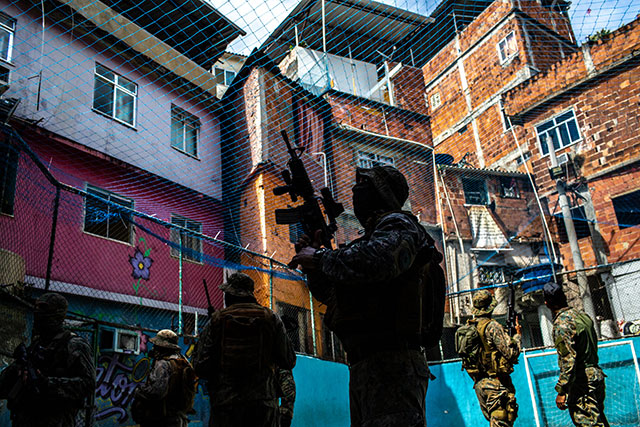
The Military Police besiege the favelas (poor neighborhoods) of Rio de Janeiro, murdering thousands of residents. Unions should organize workers defense groups against the slaughter of young black men by the forces of the “democratic state of laws.” (Foto: Dado Galdieri para o New York Times)
The components of the Pole have debated about a more extensive common program for the campaign. The MRT in its contribution called for “collective mass self-defense against a Bolsonaro coup and ultra-rightist groups, based on the unions....”18 There are also incantations of “End genocide of black youth in poor neighborhoods by the police.” But how? There is nothing about the creation of union-based workers defense groups to stop the slaughter black youth in the slums and favelas, and of indigenous people and peasants. Why not? Because that would pose point-blank the issue of the police, and the PM in particular, and the other components (PSTU, CST) of this rotten propaganda bloc support the military police when they go on “strike.” Not for nothing do the bourgeois human rights monitors of the United Nations say of these special bodies of armed men, “Brazilian police kill more than anywhere else in the world.”
The MRT proposals for the program of the Pole call “For a government of the working people without bosses!” Even if it tacks on “opening the road to a socialist society” sometime in the future, this mushy formulation is to the right even of the PSTU, which on paper calls for “a socialist government of the working people, ruling through popular councils….” (Opinião Socialista, 22 September). In either case, these are just deceptive words to hide the fact that they are calling for governments of the capitalist state. Since 1990 the PT, which characterizes its regimes as “governments of the working people,” has invariably made a popular front with some sector of the bourgeoisie, and always Lula and Dilma only managed the capitalist business. Now the PSTU-Polo promises, if there is a second round of the election, to vote for the Lula-Alckmin ticket, i.e., for a government with the bosses.
Conclusion: in the face of Bolsonaro’s coup threat of a military dictatorship, like the one that for a quarter of a century made life hell for the people and the left in Brazil, and on the other hand, Lula’s “alternative” of a broad front encompassing virtually all wings of the Brazilian bourgeoisie – two variants of the dictatorship of capital – it is necessary to fight for a workers and peasants government that expropriates the entire bourgeoisie through international socialist revolution, led by a revolutionary workers party built in the struggle to forge an authentically Trotskyist Fourth International. ■
- 1. Following a coup d’état in 1964, Brazil was governed by a military regime up to 1988.
- 2. Meaning supporters of the PT (Workers Party).
- 3. These include a 2017 “labor reform” enacted by Temer after the ouster of Dilma which legalized slave labor in rural areas (ruling that workers would not have to be paid wages, just food and housing in barracks), and authorized employee contracts overriding federal safety and hours laws. See our article, “Brazil: “Bolsonaro Out” Is Not Enough – Fight for a Workers and Peasants Government!” The Internationalist No. 63, April-June 2021.
- 4. Datafolha poll, published in Folha de S. Paulo, September 23.
- 5. In 1992 Peruvian president Alberto Fujimori dissolved Congress in order to stay in power. Historical examples of such “self coups” include the 1937 proclamation of a state of war by Brazilian president Getúlio Vargas, who instituted a corporatist Estado Novo (New State) regime; and the coup d’état by French president Louis-Napoleón Bonaparte in France, proclaiming himself emperor.
- 6. In 1992 Peruvian president Alberto Fujimori dissolved Congress in order to stay in power. Historical examples of such “self coups” include the 1937 proclamation of a state of war by Brazilian president Getúlio Vargas, who instituted a corporatist Estado Novo (New State) regime; and the coup d’état by French president Louis-Napoleón Bonaparte in France, proclaiming himself emperor.
- 7. Abbreviations correspond, in order, to the Workers Party, Communist Party of Brazil, Brazilian Communist Party, Party of Socialism and Freedom.
- 8. ICG, “Brazil’s True Believers: Bolsonaro and the Risks of an Election Year” (Crisis Group Latin America Briefing No. 47, 16 June 2022).
- 9. See “Brazil Elections: For Workers Action Against the Election Fraud and the Militarist Danger,” The Internationalist No. 53, September-October 2018.
- 10. See “Carta às Brasileiras e aos Brasileiros em defesa do Estado Democrático de Direito!” Faculdade de Direito, Universidade de São Paulo (26 July).
- 11. Social-Democratic Party of Brazil, the bourgeois conservative party that is the linchpin of the “center-right” Centrão.
- 12.
According to official statistics, 1,534 people were
killed in police actions in Rio de Janeiro in 2018,
increasing to 1,814 in 2019, 80% of them black. After
the Supreme Court banned police raids in the favelas
during the COVID pandemic, there was a dip to “only”
1,245 in 2020, but then it increased to 1,354 in 2021
(Anuário Brasileiro de Segurança Pública 2021;
Statista, 14 March 2022).
- 13. See “Racist Execution in Rio,” The Internationalist No. 51, March-April 2021. Militias now control 10% of the area of Greater Rio de Janeiro, exceeding that under the control of drug-trafficking gangs, with a population of 1.7 million people.
- 14. See our article “Break with Lula’s Popular Front, For a Revolutionary Workers Party! PT/PL Government: Fireman for the IMF” [in Portuguese}, Vanguarda Operária No. 7, January 2003.
- 15. The Manifesto of the Socialist and Revolutionary Pole calls for “an agrarian reform that secures land and conditions of production for poor peasants.”
- 16. The New Republic designates the period of Brazilian history since the enactment of the “democratic” constitution of 1988, and more generally since the end of the military dictatorship in 1985.
- 17. Quilombolas are Afro-Brazilian residents of the quilombos, which originated as settlements of escaped slaves going back to the 1500s.
- 18. “Conheça os eixos de campanha, programa, método e debates do Polo Socialista Revolucionário,” Esquerda Diário, 23 de junho.
